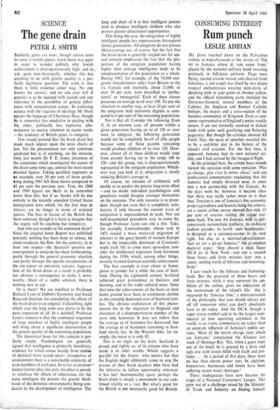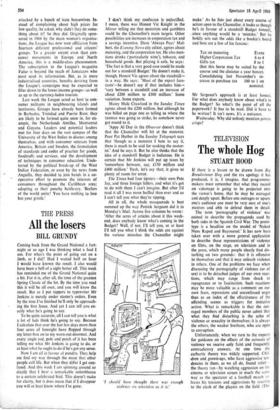Rum punch
CONSUMING INTEREST LESLIE ADRIAN
My plane touched down on the Palisadoes tarmac in mid-afternoon to the strains of 'Tek mi to Jamaica where di rum come from,' played by the national military band sweating profusely in full-dress uniform. Flags were flying, excited crowds waved and cheered from balconies, a red carpet was lined by two dozen tropical enchantresses wearing mini-skirts of shocking pink or jade green or chrome yellow, and the official welcoming party included the Governor-General, several members of the Cabinet, the Anglican and Roman Catholic bishops, the mayor and a cross-section of the business community of Kingston. Even as con- sumer representative of England's senior weekly review, I am not normally received in distant lands with quite such gratifying and flattering pageantry. But though the calendar showed All Fools' Day, the spate of speeches revealed this to be a red-letter day in the history of the island's civil aviation. For the first time, it Appeared, Jamaica had its own national air- line, and I had arrived by the inaugural flight.
In the principal bars, the artistic beau monde Viewed the occasion with some cynicism. 'Plus fa change, plus c'est la meme chose,' said one professional commentator; explaining that Air Jamaica had simply divorced BOAC _to enter into a new partnership with Air Canada. As the days went by, however, it became clear that there was really rather more to it than that. Tourism is one of Jamaica's few economic props (agriculture and bauxite-being the others); yet a recent airline survey showeetthat only 15 per cent of tourists visiting the isl4d ever ceilme back. The new Air Jamaica, witt itscaelf- consciously nationalistic publicity, its on-bOard fashion parades, its lavish 'rum bambbozles,' is= designed as a currency-earner in its own right, but also as a national advertisement. 'Get set for a jet-set Jamaica!' the promotion material urges: 'Step aboard a sleek Super DC-8 jet in New York—step out a smooth three hours and forty minutes later into a sunny, smiling world of hibiscus and humming- birds.'
I can vouch for the hibiscus and humming- birds. But the precision of three hours and forty minutes, while it may represent the am- bition of the airline, gives no indication of the momentum of the island's life: this is measured by 'Jamaica time,' a miniaturisation of the philosophy that you should always put off till tomorrow what you don't absolutely have to do today. And the DC-8, though a super status symbol said to be the largest com- mercial jet now operating anywhere in the world, is an ironic commentary on rather than an accurate reflection of Jamaica's public ser- vices. 'Most of the hotels charge rates which are fantastic,' complained the Gleaner last week of Montego Bay. 'Yet, when a guest steps out of the hotel, he is greeted by a dirty and ugly city with streets filled with trash and pot- holes . . . In a period of five days, there were no less than eleven power cuts. In addition, housewives, businesses and hotels have been suffering severe water shortages.'
These inadequacies have now become the target of a National Consumers' League. This grew out of a challenge raised by the Minister of Trade and Industry on finding himself attacked by a bunch of irate housewives. In- stead of complaining about high prices for low quality, he asked, why didn't they do some- thing about it? So they did. Originally spon- sored in 1966 by the main women's organisa- tions, the League has now won affiliation from fourteen different professional and citizens' groups. To a greater extent even than con- sumer movements in Europe and North America, this is a middle-class phenomenon. The subscription to the League's magazine Value is beyond the reach of Jamaicans who most need its information. But, as in more industrialised countries, benefits deriving from the League's campaigns may be expected to filter down to the lower-income groups—as well as up to the currency-laden tourists.
Last week the League acted as host to con- sumer militants in neighbouring islands and territories. Groups have already been formed in Barbados, Trinidad and Puerto Rico; they are likely to be formed quite soon in, for ex- ample, the Netherlands Antilles, Montserrat and Guyana. Leaders and potential leaders met for four days on the vast campus of the University of the West Indies to discuss among themselves, and with consumer veterans from America, Britain and Sweden, the formulation of standards and codes of practice for goods, foodstuffs and services, and the development of techniques in consumer education. Unde- terred by the political break-up of the West Indian Federation, or even by the news from Anguilla, they decided to join hands in a co- operative effort to promote the interests of consumers throughout the Caribbean area; adopting as their punchy battle-cry, 'Beefers of the world unite! You have nothing to lose but your gristle.'











































 Previous page
Previous page